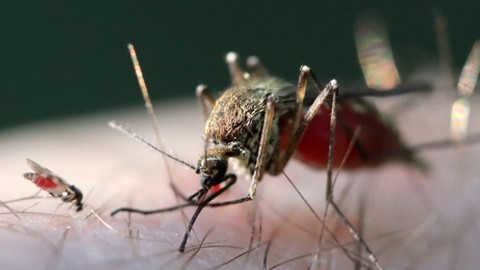Emerging Infectious Disease page
Emerging means infections that have increased recently or are threatening to increase in the near future. Information on novel emerging infectious diseases or disease outbreaks will be added here as they arise.
These infections could be
-
completely new
-
completely new to an area
-
reappearing in an area
-
caused by bacteria that have become resistant to antibiotics
Avian Influenza
 Avian influenza is a contagious respiratory illness caused by influenza viruses. Some avian influenza viruses that primarily circulate in animals have infected people on rare occasion. When influenza viruses that normally circulate in animals cause an infection in people, this is called a “novel” virus infection. Not all influenza viruses found in birds are known to cause human infections.
Avian influenza is a contagious respiratory illness caused by influenza viruses. Some avian influenza viruses that primarily circulate in animals have infected people on rare occasion. When influenza viruses that normally circulate in animals cause an infection in people, this is called a “novel” virus infection. Not all influenza viruses found in birds are known to cause human infections.
How it spreads: Flu viruses are highly contagious. People can get infected through contact with saliva, nasal secretions, and droppings (poop) from infected animals. People also can get infected through contact with virus-contaminated surfaces, poultry coops, pig pens, and supplies. Less often, people can get infected by touching an infected animal and then touching their own eyes, nose, or mouth.
Who is at risk: It is rare for avian flu to spread to people. Anyone can get the flu, but children younger than 5 years old, pregnant people, adults 65 and older, and people with weakened immune systems are at high risk for serious flu complications.
People who work closely with large numbers of birds, such as producers, are more likely to get avian flu if their animals are infected.
Signs in birds: Birds can be infected with flu viruses without showing symptoms. Signs that bird may be infected include sudden death without any prior symptoms of illness, lack of energy and appetite, a drop in egg production or soft-shelled, misshapen eggs, swelling of the eyelids, comb, wattles, and shanks, purplediscoloration of the wattles, comb, and legs, difficulty breathing, stumbling, nasal discharge, coughing, or sneezing.
If you see a sick or dead bird:
1. Anyone encountering sick or dead wild birds on private or public property is asked to report their findings immediately to State Authorities.
· Call the DNREC Wildlife Section at 1-302-739-9912 from 8 a.m. to 4:30 p.m. Monday through Friday.
· Report sightings after hours, weekends, and holidays, report sightings through the -DNREC Division of Fish and Wildlife’s sick and injured wildlife reporting form.
· Notify DDA if you find dead or sick wild birds on your farm at poultry.health@delaware.gov.
2. If a resident finds a dead bird on their property, they should wear proper personal protective equipment (PPE), including gloves, a mask and safety glasses, to dispose of it. Double-bag each dead bird found, zip-tie the bag and put it in the trash bin for pickup and disposal at a Delaware Solid Waste Authority landfill. Carefully remove and dispose of all PPE in the dedicated trash and always wash your hands.
3. DNREC also reminds hunters to be cautious when afield handling their harvests of duck and geese as the waterfowl season continues in Delaware. If you are a waterfowl hunter or come across a dead or sick bird, visit the U.S. Department of Agriculture’s Animal and Plant Health Inspection Services website for additional information on proper protocols for contact with a wild bird that may have contracted HPAI.
CDC Additional Information on HPAI in Mammals Including Dairy Cattle
Symptoms in people: People infected with avian flu viruses can have symptoms similar to the human seasonal flu, such as fever, fatigue, lack of appetite, and coughing. They may also have red eyes, nausea, abdominal pain, diarrhea, and vomiting. Some people can have serious flu complications, including inflammation of the heart (myocarditis), brain (encephalitis), or muscle (myositis, rhabdomyolysis) tissues, and multi-organ failure (for example, respiratory and kidney failure).
How Infected Poultry Can Spread Avian Influenza Handout English Spanish
Delaware Avian Influenza Information Center
Hunters—Protect Your Poultry and Pet Birds From Avian Influenza- PDF
Travel Advisories
Global Dengue – Practice Usual Precautions
August 19, 2024 – Dengue virus is a mosquito-borne disease that is primarily spread by the bite of Aedes aegypti and Aedes albopictus mosquitoes. These mosquitoes bite during the daytime and lay eggs in containers within urban areas.
Many people who are infected with dengue do not develop symptoms. About one in four people infected with the virus develop the disease and symptoms are generally mild. The most common symptoms of dengue are fever, rash, muscle pain, joint pain, bone pain, pain behind the eyes, and nausea/vomiting. Symptoms typically begin two to seven days after being bitten by an infected mosquito. Health care providers should ask all their patients about recent travel.
Some countries are reporting higher-than-usual number of dengue cases:
- Afghanistan
- Brazil
- Burkina Faso
- Cape Verde
- Colombia
- Costa Rica
- Cuba
- Ecuador
- El Salvador
- French Guiana
- French Polynesia
- Ghana
- Guatemala
- Guyana
- Honduras
- Iran
- Laos
- Mali
- Mauritius
- Mexico
- Panama
- Puerto Rico
- Samoa
- Singapore
- Sri Lanka
- Sudan
- Uruguay
The best way to reduce your risk of dengue is to avoid mosquito bites.
- Use an EPA-registered insect repellent with DEET, picaridin, IR3535, oil of lemon eucalyptus, para-menthane-diol, or 2-undecanone. Always make sure to follow label instructions.
- Use the EPA’s search tool to find the insect repellent that is right for you.
- Wear loose-fitting, long-sleeved shirts and pants. You can use 0.5% permethrin to treat clothing and gear. Permethrin is an insecticide that kills or repels mosquitoes.
- For babies and children:
- Cover strollers and baby carriers with mosquito netting.
- When applying insect repellent to babies and children, do not apply repellent to their hands, eyes, mouth, cuts, or irritated skin. Adults should apply insect repellent to their hands and then use their hands to apply to a child’s face.
- Sleep under a mosquito bed net if air conditioned or screened rooms are not available or if sleeping outdoors.
For more information on mosquito-borne disease visit: https://dhss.delaware.gov/dph/epi/mosquito.html
Oropouche in Cuba and South America – Practice Enhanced Precautions
August 19, 2024 – Oropouche is a disease caused by Oropouche virus and is spread by the bite of infected midges (small flies also called “no-see-ums”) and some mosquitoes.

Figure 1. Biting midge (left) and mosquito (right). Photo from CDC.
Symptoms of Oropouche include headache, sudden onset of fever, chills, muscle aches, stiff joints, nausea, pain behind the eyes, vomiting, or sensitivity to light. Less than one in 20 people will develop severe disease. Severe disease may result in meningitis (inflammation of the membranes that surround the brain and spinal cord), encephalitis (inflammation of the brain), or bleeding. Symptoms usually start three to 10 days after being bitten and last three to six days. Although there is no treatment for Oropouche, most people recover without long-term effects.
Brazil has reported cases of Oropouche virus being passed from a pregnant person to their fetus, possibly resulting in the death of the fetus or congenital abnormalities like microcephaly (birth defect that causes a baby’s head to be smaller than normal). Pregnant people should reconsider non-essential travel to Cuba, Bolivia, Brazil, Colombia, and Peru.
Travel Advisory – Dengue Virus in Puerto Rico
For full CDC travel advisories; Visit: https://wwwnc.cdc.gov/travel/notices
FDA Food Safety Recalls
IDPC Newsletter Article Archive
Creutzfeldt-Jakob disease (CJD) 11.2023
Information about Mpox has moved to https://publichealthalerts.delaware.gov/mpox/
Office of Infectious Disease Epidemiology
24/7 Emergency Contact Number: 1-888-295-5156
Return to Infectious Disease Home Page



